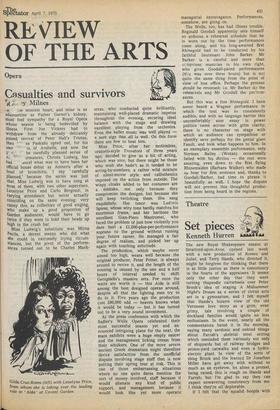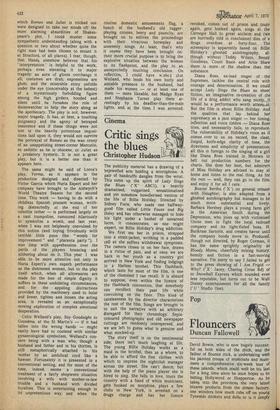Set pieces i; ) k Kenneth Hurren a.i s fAA The new Royal Shakespeare
season at Stratford-upon-Avon opened last week with a new production of Romeo and Juliet, and Terry Hands, who directed it, might be forgiven for thinking that there is as little justice as there is consistency in the hearts of the appraisers. It seems only the other day that they were turning rhapsodic cartwheels over Peter Brook's idea of staging A Midsummer Night's Dream as a series of circus acts set in a gymnasium, and I felt myself that Hands's bizarre view of the old Veronese love story as a grim, even grimy, tale involving a couple of dockland families would ignite no less enthusiasm. In the event, nearly all the commentators hated it in the morning, saying many sardonic and unkind things about Farrah's skeletal steel setting which reminded them variously not only of shipyards but of railway bridges and prison-yard catwalks and even a hydroelectric plant. In view of the sorts of thing Brook and the learned Dr Jonathan Miller have got away with without so much as an eyebrow, let alone a protest, being raised, this is rough on Hands and Farrah; but I'm glad to say they can expect unwavering consistency from me. I think they're all deplorable.
If I felt that the squalid hoopla with which Romeo and Juliet is tricked out were designed to take our minds off the more alarming absurdities of Shakespeare's plot, I could muster some sympathetic understanding (along with a question or two about whether quite the right man had been chosen to mount it at Stratford, of all places). I fear, though, that Hands somehow believes that his ' interpretation ' is helpful to the work, perhaps even elevating it to major tragedy: an aura of gloom overhangs it all; costumes are drab; expressions are glum; and the miserable story unfolds under the eye (conceivably at the behest) of a mysteriously forbidding figure among the high girders, hooded and silent until he forsakes the role of doomwatcher to help the story along as the apothecary. The play is not, however, major tragedy. It has, at best, a touching poignancy and the agony of betrayed innocence and if these things were not lost in the heavily portentous impositions laid upon it, they would not survive the portrayal of Romeo as the wan crony of an unappetising street-corner Mercutio, as sadistic as he is obscene, or Juliet as a predatory hysteric. It is not a great play, but it is a better one than it appears here.
The same might be said of Lorca's play, Yerma, as it appears in the production designed and directed by Victor Garcia which Nuria Espert and her company have brought to the Aldwych's World Theatre Season for the second time. This work — having to do with a childless Spanish peasant woman, writhing distractedly at the end cf her infertile tether — is performed largely on a vast trampoline, rumoured hilariously to symbolise a womb, and last year, when I was not helplessly convulsed by this notion (and toying frivolously with terrible little puns like " womb for improvement" and "placenta party "), I was limp with apprehension over the perils of the players bouncing and slithering about on it. This year I was able to be more attentive not only to Nuria Espert's own superb performance as the distressed woman, but to the play itself which, when all allowances are made for the loss of simple dignity it suffers in these undulating circumstances, and for the appaling distractions provided by the machinery used to hoist and lower, tighten and loosen the acting area, is revealed as an exceptionally moving exploration of complex emotional desperation.
Colin Welland's play, Say Goodnight to Grandma, at the St Martin's — if it had fallen into the wrong hands — might easily have had to contend with similar gynaecological symbolism, Welland's concern being with a man who, though a husband and father and in his thirties, is still metaphorically attached to his mother by an umbilical cord like a hawser. Fortunately it is presented in a conventional setting, and for most of the time, indeed, seems a conventional treatment of a fairly shopworn situation involving a wife with mother-in-law trouble and a husband with divided loyalties. This is entertaining enough in its unpretentious way, and when the routine domestic amusements flag, a bunch of the husband's old ruggerplaying cronies, beery and paunchy, are brought on to enliven the proceedings with their vivacious horseplay and unseemly songs. At least, that's why it seems they have been brought on: their more crucial purpose is to bring the explosive situation between the women to its flashpoint, and the play to an unexpectedly touching conclusion. On reflection, I could have v..shed that Welland, who lends his own burly and amiable presence to the husband, had made his women — or at least one of them — more likeable, but Madge Ryan and Stephanie Turner play them arrestingly by his deadlier-than-the-male lights, and, at the time, I was arrested.



































 Previous page
Previous page